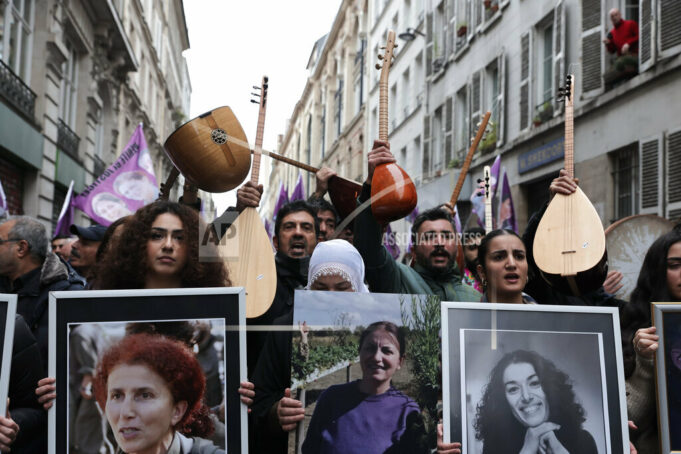PARIS—Members of France’s Kurdish community and others held a silent march to honor three people killed in a shooting at a Kurdish cultural center in Paris that prosecutors say was motivated by racism.
Turkey summoned France’s ambassador Dec. 26 over what it called “black propaganda” by Kurdish activists after the shooting. Some have marched in Paris with flags of the banned Kurdistan Workers’ Party (PKK), or suggested that Turkey was linked to the shooting.
A 69-year-old Frenchman was handed preliminary charges Dec. 26 of racially motivated murder and weapons violations over the Dec. 23 shooting, the Paris prosecutor’s office said. The suspect told investigators that he had wanted to kill migrants or foreigners and then had planned to kill himself, and said he had a “pathological” hatred of non-European foreigners, according to prosecutors.
He was briefly put in psychiatric care, but then returned to ordinary police custody. The suspect’s name hasn’t been officially released though he is identified by French media as William K.
The shooting shocked and infuriated the Kurdish community in France, which organized the silent march on Dec. 26. Demonstrators marched from the site of the shooting to the location where three women Kurdish activists were found shot dead in 2013.
“Every day we ask ourselves when someone will shoot at us again. Ten years ago, we were attacked in the heart of Paris and 10 years later again,” said Dagan Dogan, a 22-year-old Kurd at the march. “Why there was nothing done to protect us?”
The solemn march ended calmly. Skirmishes broke out in the neighborhood where the killings took place, and again on the sidelines of a mostly peaceful Kurdish-led demonstration on Dec. 25.
Prosecutors say the suspect had a clear racist motive for the shooting.
Anti-racism activists and left-wing politicians have linked it to a climate of hate speech online and anti-immigrant, xenophobic rhetoric by far-right figures. The French government has reported a rise in race- or religion-related crimes and violations in recent years.
French authorities have called the Dec. 23 attack an isolated incident, but some Kurdish activists in Paris think it was politically driven.
Turkey summoned French Ambassador Herve Magro on Dec. 26 to relay unease over what it called black propaganda being waged against Turkey by Kurdish militant groups following the attack, the Turkish state-run Anadolu Agency reported.
Turkey “expects France to act prudently over the incident and not to allow the (banned PKK) terrorist organization to advance its sneaky agenda,” Anadolu reported.
The PKK has waged an armed separatist insurgency against the Turkish state since 1984 for independence, which has more recently morphed into demands for greater autonomy. The conflict has killed tens of thousands of people and displaced many, with a significant number of ethnic Kurds and alleged PKK supporters migrating to European countries.
Turkey’s army has battled Kurdish militants affiliated with the PKK in southeast Turkey as well as in northern Iraq, and recently launched a series of strikes against Syrian Kurdish militant targets in northern Syria.
Turkey, the United States and the European Union consider the PKK a terror group, but Turkey accuses some European countries of leniency toward alleged PKK members. That frustration has been the main reason behind Turkey’s continued delay of NATO membership for Sweden and Finland. (AP)
Nearly 3,000 civilians killed or injured in Saudi strikes on Yemen’s Sa’ada in 2022: Official
A Yemeni health official says nearly 3,000 civilians, including African refugees, lost their lives or sustained injuries in 2022 as a result of artillery and missile strikes by Saudi military forces in Yemen’s northwestern province of Sa’ada.
Director of Razih Rural Hospital, Abdullah Musreeh, told Yemen’s official Saba news agency on Dec. 28 that the number of civilian casualties in the Yemeni regions stands at 2,909, and that the figure covers the period between early January and late December of 2022.
He added that at least 907 people were killed or wounded during the UN-brokered truce that lasted six months and expired on October 2, when gunshots, artillery rounds and missiles by Saudi border guards targeted the Shada’a district.
Musreeh said his hospital received 111 dead bodies and 796 injured people, including African asylum seekers, throughout the mentioned period, stressing that Saudi Arabia never committed itself to the truce and its criminal acts continue unabated.
The Yemeni health official noted that most of those critically wounded were transferred to medical centers in the capital Sana’a, as Razih hospital was short of medical equipment to provide necessary services.
Separately, the Director of Monabbih Rural Hospital Ali al-Ayashi stated that the hospital has received 169 bodies and 1,833 injured people since January.
He pointed out that the Riyadh regime presses ahead with its horrendous crimes against the Yemeni nation and African asylum seekers.
Ayashi also made a reference to the brutal methods of torture by Saudi border authorities against Yemenis citizens and African refugees, arguing that such practices repudiate the kingdom’s claims of respect for international humanitarian principles and conventions.
Saudi Arabia launched the devastating war on Yemen in March 2015 in collaboration with its Arab allies and with arms and logistics support from the U.S. and other Western states.
The objective was to reinstall the Riyadh-friendly regime of Abd Rabbuh Mansour Hadi and crush the popular Ansarullah resistance movement, which has been running state affairs in the absence of a functional government in Yemen.
While the Saudi-led coalition has failed to meet any of its objectives, the war has killed hundreds of thousands of Yemenis and spawned the world’s worst humanitarian crisis. (PressTV.ir)













